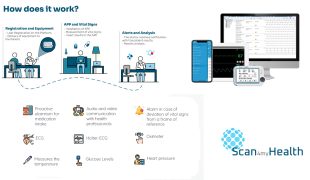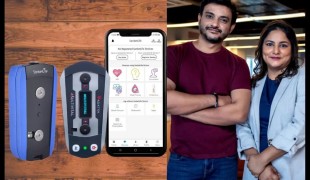- 9288
- 427
- 8
- 11
- 0
- Help Ukraine
About the solution
Maybe it was caused by work-related stress, or maybe by something else, but while writing my PhD thesis I felt that my heart started to act differently. In particular I felt odd, noticeable and unannounced poundings. Hoping that the problem would be temporary, I waited a couple of weeks for it to wear off, but it didn’t so a visit to the doctor was scheduled for further analysis. In the meanwhile, BITalino (http://www.bitalino.com) has become a staple in my stash of DiY hardware tools, and in the days preceding my medical appointment, I thought that doing some Electrocardiography (EKG) recordings of my pounding heart would at least be a memento of this period. Interestingly, even a medical layman like myself could see from the EKG that every now and then the heart sort of skipped a beat or was too eager to beat (these are called arrhythmias). On the day of my medical appointment, a standard EKG screening (with a couple of minutes worth of data) showed arrhythmias nowhere to be found. However, before the doctor sent me on my way, I thought that showing him the data I had collected wouldn’t hurt. After some quick fiddling with Python, the EKG strip shown in Figure 1 pops up to the doctor. Then after a more detailed examination - including an echocardiogram - the confirmation… I do have an arrhythmic heart, which turns out to be pretty common and nothing to worry about when the heart is structurally sound (as the echocardiogram confirmed in my case). Nevertheless, the doctor did recommend keeping an eye on whether the arrhythmias increase (which could mean trouble). Although I could keep slapping a bunch of cables and a PCB on me every day (Figure 2), miniaturized physiological computing devices are pretty fun to build and play with (at least for me) so I decided to make something more practical. The process resulted in CubiKG (https://opensource.com/life/15/6/how-build-diy-activity-tracking-device), a wearable Holter-like device that can be used at home or during sleep for Lead I EKG and activity tracking. CubiKG works with the open source Android app BITadroid for data logging (https://play.google.com/store/apps/details?id=ceu.marten.bitadroid&hl=en) and with freeware software like Kubios (http://www.kubios.com/hrv-standard/) for analysis.
这些解决方案不应包括使用药物,化学品或生物制品(包括食品);创伤性设备;冒犯性的,商业或内在危险的内容。该解决方案未经医学验证。请谨慎进行!如果您有任何疑问,请咨询健康专家。
-
-
100
-
1
-
1400

Scan4myHealth | Real-time solution for monitoring patient vital signs
CAREGIVING
COMMUNICATION: Communicating, whether by speaking, listening, or other means
Stroke
App (Including when connected with wearable)
AI algorithm
Assistive Daily Life Device (to help ADL)
Promoting self-management
To implement medical examination
Restoring heart health
Managing diabetes
Manage Medication
Rehabilitating After Stroke
Preventing (Vaccination, Protection, Falls, Research/Mapping)
Caregiving Support
Cardiology
General and Family Medicine
Internal Medicine
Physical Medicine and Rehabilitation
Pneumology
Portugal
-
-
-
168
-
4
-
3038

A father's heart scare leads to a new invention by his son and his daughter in law
CAREGIVING
Acute Coronary Syndrome (Heart attack/Cardiac arrest)
Assistive Daily Life Device (to help ADL)
App (Including when connected with wearable)
Chest pain or discomfort
Chest tightness/pressure
Promoting self-management
Restoring heart health
Preserving Organ Function
Preventing (Vaccination, Protection, Falls, Research/Mapping)
Raise awareness
Caregiving Support
Cardiology
Internal Medicine
Physical Medicine and Rehabilitation
India
-
-
-
527
-
0
-
12724

Proloquo2Go – App to help people communicate
CAREGIVING
COMMUNICATION: Communicating, whether by speaking, listening, or other means
Social interaction
Paralysis
Autism
Cerebral Palsy
Brain Stroke
Brain Injury (Abscess, Brain Barrier Defect, Brain Contusion, Brain Hemorrhage, Brain Edema)
Assistive Daily Life Device (to help ADL)
Assistive Technology access
App (Including when connected with wearable)
Tremors
Muscle cramps or spasms
Difficulty coordinating movements
Muscle weakness
Difficulty speaking or understanding speech
Trouble with fine motor skills (e.g., writing, buttoning clothes)
Twitching or involuntary movements (myoclonus)
Acquired language impairment (Aphasia)
Promoting self-management
Managing Neurological Disorders
Building Supportive Community Relationships
Promoting inclusivity and social integration
Improving Speech and Communication
Caregiving Support
Clinical Pathology
Medical Genetics
Neurology
Pediatrics
Rheumatology
Netherlands
-
 zh
zh